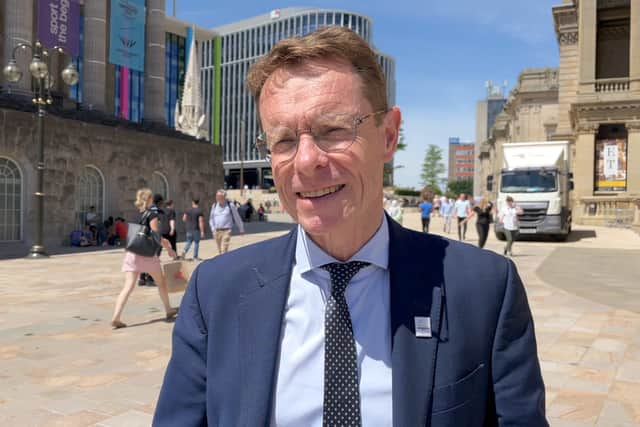How climate change will impact West Midlands: severe flooding, water scarcity, heatwaves
and live on Freeview channel 276
There can be severe impact of climate change on the West Midlands in the decades ahead, a new research found.
The study - A Summary of Climate Change Impacts in the West Midlands Combined Authority Area -set out the potential impacts of climate change on businesses, infrastructure and people’s health in the West Midlands in the future.
Advertisement
Hide AdAdvertisement
Hide AdFor the study, the latest data to chart the predicted impact of increased cases of severe flooding, water scarcity and more intense and prolonged heatwaves was used.
The report also highlights the opportunities to adapt and ramp up the fight against, climate change could offer the West Midlands. These include local businesses coming forward to meet an increased demand for innovation to develop more climate resilient infrastructure and low carbon, fuel saving technology and products.
Which neighbourhoods will be hit the hardest?
The new study found that people living in parts of north Wolverhampton, east Walsall, north-east Sandwell and the inner-city areas of west and north Birmingham could be hit hardest due to their existing high levels of deprivation, high risk of flooding and relatively high proportion of residents who are particularly vulnerable to the health impacts of climate change.
Economic impact
The report commissioned by the WMCA warns of the economic impact to the region and how the infrastructure sector will need to adapt to deal with the physical damage.


These could include:
Advertisement
Hide AdAdvertisement
Hide Ad• Disruption to local energy supplies - the failure of just five electricity substations is estimated to cost the local economy £27m a day
• Damage to local transport infrastructure disrupting people’s ability to get to work and requiring expensive repairs
• Disruption to the aviation industry
• Disruption to supply chains, affecting business costs and productivity
• Damage to infrastructure belonging to local businesses
• Disruptions to water supply – businesses in England alone use an estimated 1bn litres of water a day
Advertisement
Hide AdAdvertisement
Hide AdWest Midlands’ net zero target
The West Midlands declared a climate emergency in 2019 and agreed an ambitious WM2041 target to reach net zero within the next two decades.
The need for more powers and funding to fight climate change at a local level are a key part of on-going discussions between the West Midlands and Government on a new ‘Trailblazing Devolution Deal’ for the region.
What West Midlands leaders have said
Andy Street, Mayor of the West Midlands and WMCA Chair, said: “As we seek to tackle the climate emergency, a recent UN report has warned that current global policies are not sufficient to keep us on track for the 1.5°C target signed up to at the Paris Agreement in 2015.
“We have all seen the alarming frequency and intensity of extreme weather events in recent years which only serves to confirm the importance of adapting to the changing climate.
Advertisement
Hide AdAdvertisement
Hide Ad“Our WM2041 net zero commitment demonstrates our level of ambition when it comes to mitigating the impact of climate change. As part of our devolution deal discussions with Government, we’re seeking more funding and responsibility in order to establish a regional framework that will help to coordinate climate adaptation activity - working with local communities to co-create the solutions we need”
Cllr Ian Courts, portfolio lead for environment and energy and leader of Solihull Metropolitan Borough Council added: “The evidence shows that investment in measures to help us cope with climate change, and become more resilient to extreme weather, have a wider positive impact - benefiting people’s health, creating jobs and improving the overall environment.
“We need to reinforce the idea that climate change and economic growth are not at conflict with each other. It’s actually very much the opposite and we’re well placed in the West Midlands to capitalise on the opportunities ahead. I’m pleased to see this report come forward to provide a foundation for the adaptation and action required in the region.”
You can view the report here.
The report uses evidence and information from the UK Climate Change Risk Assessment, the Met Offices UK Climate Change Projections 2018 and the West Midlands Climate Change Adaptation Plan.
Comment Guidelines
National World encourages reader discussion on our stories. User feedback, insights and back-and-forth exchanges add a rich layer of context to reporting. Please review our Community Guidelines before commenting.
